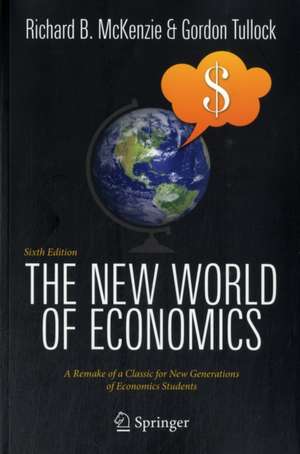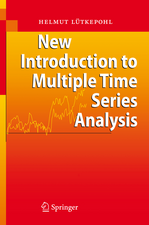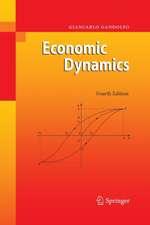The New World of Economics: A Remake of a Classic for New Generations of Economics Students
Autor Richard B. McKenzie, Gordon Tullocken Limba Engleză Paperback – 30 apr 2012
This new edition of The New World will expose new generations of economics students to how McKenzie and Tullock have applied in a lucid manner a relatively small number of economic concepts and principles to a cluster of topics that have been in the book from its first release and to a larger number of topics that are new to this edition, with the focus of the new topics on showing students how economic thinking can be applied to business decision making. This edition continues the book’s tradition of taking contrarian stances on important economic issues. Economics professors have long reported that The New World is a rare book in that students will read it without being required to do so.
Preț: 597.52 lei
Preț vechi: 702.96 lei
-15% Nou
Puncte Express: 896
Preț estimativ în valută:
114.34€ • 122.26$ • 95.33£
114.34€ • 122.26$ • 95.33£
Carte tipărită la comandă
Livrare economică 17 aprilie-01 mai
Preluare comenzi: 021 569.72.76
Specificații
ISBN-13: 9783642273636
ISBN-10: 3642273637
Pagini: 450
Ilustrații: XVIII, 559 p. 28 illus.
Dimensiuni: 155 x 235 x 33 mm
Greutate: 0.79 kg
Ediția:6th ed. 2012
Editura: Springer Berlin, Heidelberg
Colecția Springer
Locul publicării:Berlin, Heidelberg, Germany
ISBN-10: 3642273637
Pagini: 450
Ilustrații: XVIII, 559 p. 28 illus.
Dimensiuni: 155 x 235 x 33 mm
Greutate: 0.79 kg
Ediția:6th ed. 2012
Editura: Springer Berlin, Heidelberg
Colecția Springer
Locul publicării:Berlin, Heidelberg, Germany
Public țintă
Lower undergraduateCuprins
Part I - The New World of Economic Thinking: Economic Thinking.- Anything Worth Doing Is Not Necessarily Worth Doing Well.- Maslow’s Hierarchy of Needs—And Economist’s Demand.- Part II -The New World of Market Economics: Price and the “Law of Unintended Consequences”.- Pricing Lemons, Views, and University Housing.- Markets and More Markets.- Part III - The New World of Personal Economics: Marriage, Family, and Divorce.- Sexual Behavior.- Exploitation of Affection.- Dying: The Most Economical Way to Go!.- Cheating and Lying.- Fat Economics.- Part IV - The New World of Pricing Strategies: Why Sales.- Why Popcorn Costs So Much at the Movies.- Why So Many Coupons.- Why Some Goods Are Free.- The Question of Queues.- Part V - The New World of College and University Education: The University Economy.- The Economics of Learning.- Does the NCAA Exploit College Athletes?.- Why Professors Have Tenure and Business People Don’t.- Part VI - The New World of Contrarian Economics: Public Choice Economics.- In Defense of Monopoly: Behavioral Economics.- Behavioral Economics.- Problems with Behavioral Economics.- Why Men Earn More on Average than Women—And Always Will.
Notă biografică
Richard McKenzie is the Walter B. Gerken Professor of Economics and Management at the Merage School of Business, University of California, Irvine. He has written over thirty academic and general-audience books. He is also co-author with Dwight Lee of a widely used textbook, Microeconomics for MBAs: The Economic Way of Thinking for Managers. His book with Gordon Tullock, The New World of Economics, has been used over the years in most of the country’s leading colleges and universities and has been translated into several languages. Professor McKenzie’s most recent general-audience book is HEAVY! - The Surprising Reasons America Is the Land of the Free — And the Home of the Fat.
Gordon Tullock is a University Professor (Emeritus) of Law and Economics and Distinguished Research Fellow at the James M. Buchanan Center for Political Economy, George Mason University. He is one of the founders of public choice economics and has done pioneering work in the political economy of rent seeking, as well as any number of economic subdisciplines that emerged during his long academic career. His book The Calculus of Consent, which he coauthored with James Buchanan, is a widely acknowledged classic in economics, first published a half-century ago.
Gordon Tullock is a University Professor (Emeritus) of Law and Economics and Distinguished Research Fellow at the James M. Buchanan Center for Political Economy, George Mason University. He is one of the founders of public choice economics and has done pioneering work in the political economy of rent seeking, as well as any number of economic subdisciplines that emerged during his long academic career. His book The Calculus of Consent, which he coauthored with James Buchanan, is a widely acknowledged classic in economics, first published a half-century ago.
Textul de pe ultima copertă
The New World of Economics, 6th edition, by Richard McKenzie and Gordon Tullock, represents a revival of a classic text that, when it was first published, changed substantially the way economics would be taught at the introductory and advanced levels of economics for all time. In a very real sense, many contemporary general-audience economics books that seek to apply the “economic way of thinking” to an unbounded array of social issues have grown out of the disciplinary tradition established by earlier editions of The New World of Economics.
This new edition of The New World will expose new generations of economics students to how McKenzie and Tullock have applied in a lucid manner a relatively small number of economic concepts and principles to a cluster of topics that have been in the book from its first release and to a larger number of topics that are new to this edition, with the focus of the new topics on showing students how economic thinking can be applied to business decision making. This edition continues the book’s tradition of taking contrarian stances on important economic issues. Economics professors have long reported that The New World is a rare book in that students will read it without being required to do so.
This new edition of The New World will expose new generations of economics students to how McKenzie and Tullock have applied in a lucid manner a relatively small number of economic concepts and principles to a cluster of topics that have been in the book from its first release and to a larger number of topics that are new to this edition, with the focus of the new topics on showing students how economic thinking can be applied to business decision making. This edition continues the book’s tradition of taking contrarian stances on important economic issues. Economics professors have long reported that The New World is a rare book in that students will read it without being required to do so.
Caracteristici
When published in its first edition in the 1970s, The New World of Economics was adopted practically everywhere Professors have adopted TNW because they did not have to force students to read it -they want to read it The book addresses economic issues in a style more appropriate for the college market, at a slightly higher level of sophistication, and with graphs (which professors will like) Includes supplementary material: sn.pub/extras









